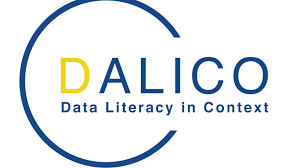Here you have a summary of the project
DaLiCo – Data Literacy in Context – is focusing on increasing the visibility, quality and usage of existing Data Literacy activities at the participating universities. Subsequently, the project partners will develop collaboration and infrastructures between departments, institutions and external partners to encourage the building of a Data Literacy community for conveying Data Literacy competencies and thus, (i) contribute to a cultural change at the participating institutions regarding student’s and lecturer’s attitudes towards Data Literacy and openness, (ii) enable lecturers and students to develop custom-tailored procedures to successfully deal with data in their specific domain and (iii) significantly increase lecturer’s and student’s data competences and thus increase their academic success and qualify them for a successful career by adapting to the growing needs for Data Literacy competencies in the increasingly data driven job markets. The above mentioned objectives especially contribute to the implementation of European policies such as the Renewed EU agenda for higher education (COM(2017) 247), the Digital Education Plan (COM(2018) 22) and the New Skills Agenda for Europe (COM(2016) 381).
For ensuring that all of the ambitious objectives are achieved, the project DaLiCo develops a set of five interconnected activities. Therefore, the following distinctive Intellectual Outputs will result:
(i) Data Literacy Map – which will visualize existing competencies and personal expertise including resources, projects and good practice examples.
(ii) Train-the-Trainer concept – including training handbook, e-leaning material and teachers’ notes. Learning material will be conceptualized and designed in a way which allows a modular use. Modules will address generic Data Literacy competencies such as data culture, data ethics and critical thinking and will incorporate country specific views experiences, approaches and perspectives.
(iii) Data Literacy Learning space – concept for the relevant content and components including implementation of a Data Learning Lab.
(iv) Data Literacy measurement and assessment tool – which will assists in mapping individual existing Data Literacy skills and which will help to identify potential gaps.
(v) Pilot concept for local implementation of international Data Literacy standard – including corresponding recommendations of how to incorporate various local conditions.

